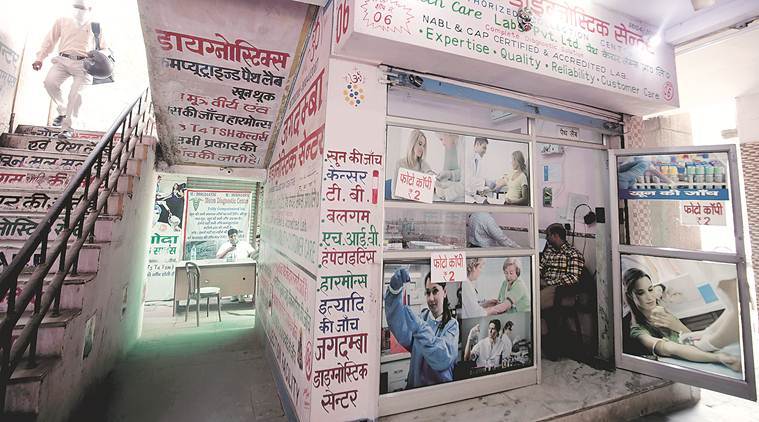Stay updated with the latest - Click here to follow us on Instagram
Hardlook: Pathological lies
Long queues at hospitals and hefty discounts have meant a booming business for path labs offering a plethora of diagnostic tests. But with no pressure to get accredited and in the absence of a regulatory framework, many suspicious ones are mushrooming across the capital.
 Labs outside GTB Hospital. (Express photo by Praveen Khanna)
Labs outside GTB Hospital. (Express photo by Praveen Khanna)
At first glance, Shaheed Hussain couldn’t believe his blood test report. A chance visit to a nearby diagnostic centre had turned his world upside down. A healthy Hussain, who had never been diagnosed with any blood infection, was holding a piece of paper that declared he was HIV positive.
For a few seconds, Hussain stood frozen. He then rushed to another diagnostic centre to get himself re-tested. This time, though, the result for the incurable disease was negative. “I wanted to get a medical fitness certificate to apply for a job in Saudi Arabia. The first report came as a shock. I still curse the day I went to that centre,” said Hussain, now packing his bags for foreign shores.
An investigation into Hussain’s case by the Delhi Medical Council (DMC) in January this year found that the diagnostic centre-cum-pathology lab had been functioning without a full-time pathologist. The tests were being conducted by technicians who did not have expertise in approving these reports.
“The report was signed by an MBBS doctor who was not even aware of the case. We cancelled his licence from the state medical council for 90 days. This is the maximum punishment we can give in cases where labs give false reports,” said Dr Girish Tyagi, registrar, DMC, a regulatory body for registered doctors and medical education in the state.
 In the absence of a regulatory mechanism, the business of such pathology labs and diagnostic centres is booming in the capital. What started a few years ago as an alternative for patients who wanted to avoid long queues in hospitals has now mushroomed into a competitive business that lures customers by promising discounts and sending out bulk SMSes. A single health package, which includes tests such as haemoglobin, platelet count, liver function, kidney function, thyroid, urine, HIV and lipid profile, can cost anywhere between Rs 500 and Rs 4,000 — depending on which lab one picks.
In the absence of a regulatory mechanism, the business of such pathology labs and diagnostic centres is booming in the capital. What started a few years ago as an alternative for patients who wanted to avoid long queues in hospitals has now mushroomed into a competitive business that lures customers by promising discounts and sending out bulk SMSes. A single health package, which includes tests such as haemoglobin, platelet count, liver function, kidney function, thyroid, urine, HIV and lipid profile, can cost anywhere between Rs 500 and Rs 4,000 — depending on which lab one picks.
“We receive around 10 complaints every year against such labs for providing incorrect reports to patients. As a medical council, we are limited only to taking action against doctors. There are no parameters followed while setting up a lab in Delhi,” said Dr Tyagi.
While there is a lack of comprehensive data on the number of path labs running in the capital, experts suggest more than 1,000 exist, mostly running outside hospitals. In many cases, unqualified technicians, in the absence of any supervision, are put in charge of running the labs — from home collection of blood to testing the samples.
Single-room setups
Adjoining the All India Institute of Medical Sciences (AIIMS) campus is a lane known for conducting medical tests at relatively cheaper rates. As one walks outside, representatives of these labs display visiting cards, trying to catch the attention of patients or relatives. Another employee waits, ready to guide anyone towards the lab.
“We are the best among all the labs here. Whatever price they will offer you for a health package, I will give an additional discount on that. Our reports are authentic and approved by qualified doctors,” said a 20-year old man, sitting inside a 6×6 ft room in the lane. Its walls painted black, the lab has a table and chair for the youth, who makes a call to his “boss” to confirm how low the prices can go. There are no X-ray or ultrasound machines, but the lab promises an “exclusive diagnostic facility”.
 Last year, a surprise visit to a lab in east Delhi’s New Kondli had shocked the sub-divisional magistrate, who discovered that the technician was not even aware of the normal range of blood sugar levels. “The technician was under-qualified and reports were approved using a scanned signature of a doctor. It was shut and action was taken against the doctor whose name was mentioned in the report,” said a senior DMC member.
Last year, a surprise visit to a lab in east Delhi’s New Kondli had shocked the sub-divisional magistrate, who discovered that the technician was not even aware of the normal range of blood sugar levels. “The technician was under-qualified and reports were approved using a scanned signature of a doctor. It was shut and action was taken against the doctor whose name was mentioned in the report,” said a senior DMC member.
Flagging the perils such labs pose, Dr Amit Dinda, professor, department of pathology, AIIMS said: “Many times, we have to ask patients to get themselves re-tested as the report seemed to be inauthentic. These labs are not following any quality control and one should not be solely dependent on such results.”
Outside Delhi government’s Guru Teg Bahadur Hospital, a complex housing medical shops and laboratory services highlights just how cut-throat the business is. Shop owners have hired representatives who loom outside the complex, and as soon as a patient enters, the race to woo him begins. Each representative offers a discounted rate and promises to hand over the test reports in as little as two hours.
The owner of a diagnostic centre, who has set up a counter at the entrance of the complex, rues how new players are entering the market. “We have been in this business for over 25 years now. Other labs operating in this complex cannot match the facilities we offer. Even then, our business is being affected.”
To ensure patients trust the authenticity of one particular lab, its owner has put up X-ray reports on the walls, displaying sets of lungs. The shop, which has a single computer system and a refrigerator, claims it can diagnose complex lung diseases, though it has only two people to deal with patients.
The way ahead
To tighten the noose over such illegal path labs, the Union government had passed the Clinical Establishments (Registration and Regulation) Act, 2010. The Act calls for mandatory registration of all clinical establishments, including diagnostic centres and single-doctor clinics across all recognised systems of medicine, both in the public and private sectors. So far, 11 states — Sikkim, Mizoram, Arunachal Pradesh, Himachal Pradesh, Uttar Pradesh, Bihar, Jharkhand, Rajasthan, Uttarakhand, Assam and Haryana — and all Union Territories except Delhi have adopted the Act.
But the Act has its loopholes, say experts. “The Act, which came up to regulate the medical profession, is somehow strangulating it. We need to have a discussion with stakeholders to ensure the autonomy of this profession is not lost,” said Dr A K Aggarwal, retired dean of Maulana Azad Medical College.

Currently, the Delhi government regulates nursing homes and private hospitals under the Nursing Home Cell, but there is no way to monitor functioning of path labs. “The Act that applies to registration and regulation of all clinical establishments will help the government tighten the noose on diagnostic centres and path labs in the city. We have been planning to bring in a system to standardise the working of these labs,” said Dr Kirti Bhushan, Director General of Health Services, Delhi government.
The National Accreditation Board for Testing and Calibration Laboratories (NABL) provides laboratory accreditation services to labs performing tests/calibrations in accordance with ISO/IEC 17025:2005 and ISO 15189:2012. However, according to sources, of the roughly 1,000 diagnostic labs in Delhi, about 10% are NABL accredited.
According to officials, in some cases, a single pathologist coordinates with 5-10 laboratories in a day. “These labs are minting money by fooling patients. Delhi is already running short of pathologists, so existing ones are making money by getting involved in such malpractices. Some of them just approve reports without even looking at them,” said Dr Anil Bansal, DMC member.
In May this year, the Delhi Police had sealed a lab in Adarsh Nagar and arrested two men for issuing around 23,000 bogus test reports in a year. During the probe, police found that Unicare Path Lab had been functioning out of a dilapidated room without any equipment.
In September, the Delhi High Court had asked the Aam Aadmi Party government to regulate the functioning of labs. Terming it a “serious issue”, the court also asked the government to submit a report on steps that can be taken to control these entities in the absence of a law.
“We have initiated a survey to find out the number of such labs operating in Delhi. The Chief District Medical Officer of every district is conducting it. Once the survey is done, we will advise the labs to get themselves accredited from NABL, at least at the entry level,” said Sanjeev Khirwar, secretary, health, Delhi government.
The AAP government is also planning to bring in the Delhi Health Bill, which will regulate the functioning of these labs. “The Bill has been drafted by the committee and submitted to us. We will finalise it soon, so the labs can comply with the rules,” said Khirwar.
With an aim to eliminate touts, the Delhi government has also introduced ‘Quality Healthcare for All’, a scheme that includes 52 surgeries for which patients can be referred from a government hospital to an empanelled private one if the waiting time is a month or more. The government has also tied up with private centres to provide high-end diagnostics, such as MRI and PET-CT, which are not available at government hospitals. These free-of-cost tests can be availed from 67 empanelled private labs and hospitals.
The Medical Council of India had, in 2014, issued an advisory to all medical councils, asking them to monitor diagnostic centres and take immediate action whenever there is a complaint of unethical practices, such as accepting commissions or referrals for diagnostic tests. The council had also written to the state government to enforce legal provisions for registration of private diagnostic centres in the capital, and to put in place mechanisms to monitor and prosecute unethical practices among doctors in prescribing diagnostic tests.
Dr Arvind Lal, chairman and managing director of Dr Lal PathLabs — whose 32 laboratories are accredited by NABL — blamed the government for the gaps. “The government is not interested in having quality labs of its own… else the Clinical Establishment Act 2010 would have been completely implemented by now. These centres are ‘testing shops’, and not testing labs. If a lab is not NABL-accredited, it is cutting corners at every step and compromising with the lives of patients.”







